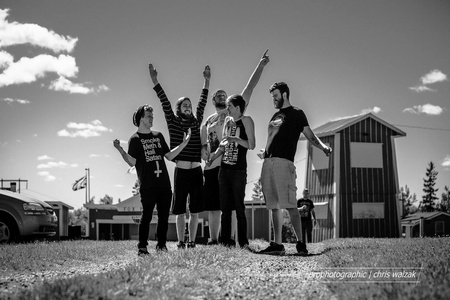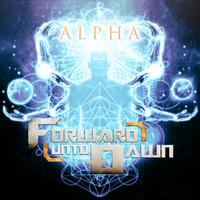Now You Know: Forward Unto Dawn
Friday, 10th July 2015
Formation: 2011
Location: Nova Scotia, Canada
Style: Modern progressive metal
Personnel: Din Stonehouse (Vocals); Dylan Wallace (Guitar); Taran Murray (Guitar); Devan Smith (Bass); Nick MacDonald (Drums)
Latest Release: ALPHA, 2015 (Self-Released)
Due to the level of depth bassist Devan Smith provided for the questions, this one will stay in a more traditional Q&A format. Check out the band’s conceptual story framework, where they’d like to find themselves in the future, their definition of progresssive, and more!
Dead Rhetoric: Could you give a brief history of Forward Unto Dawn?
Devan Smith: Well, it technically started back in 2011 with our old singer, Alex Barnes, and I. We had played in random little high school bands and with graduation coming up we wanted to start something serious. Dylan was one of the best guitar players in our school so we went to him with the idea. Like us, he had played music all through school and had even been in a “real” band that played shows (unlike us). The We Won’t Die EP came together between the three of us in 2012 and we found members to fill the spots, going through a few before finally getting Nick and Taran. From there we started playing local shows and branching out around the province. During the writing process of ALPHA Alex ended up parting ways to pursue other ambitions, which opened the door to Din, who really dove head first into the writing process with us.
Dead Rhetoric: Where did the name Forward Unto Dawn come from?
Smith: Ha-ha, well, as many have figured out by now it’s a reference to a ship in the Halo universe called the UNSC Forward Unto Dawn. We’re all gamers and fans of the series. At the time the band was formed it was a more obscure reference, but shortly after we popped up the franchise released the movie Halo: Forward Unto Dawn and the name wasn’t so clever anymore. Spent a good few weeks having people post the movie poster on our wall being totally surprised, it was a funny time.
Dead Rhetoric: Who are some of the band’s biggest influences?
Smith: Overall I’d say our biggest influence is Between the Buried & Me. Their use of storytelling, songwriting styles and techniques are qualities that all of us really relate to musically. But our writing also draws influence from bands like The Contortionist, Cloudkicker, Meshuggah, The Devil Wears Prada and Protest the Hero. Lyrically, aside from the mentioned bands, things like Evangelion were a good source of influence in ALPHA. With Din involved from the get-go for our next EP and taking the reigns on the lyrical end of things there’s a lot of inspiration from The Legend of Zelda’s storytelling style as well. We all bring some influence from unexpected corners of the artistic world I suppose.
Dead Rhetoric: You’ve had three years since your last EP, how do you feel the band has progressed since then?
Smith: When we first formed almost all of our instrumental music was written by Dylan, with some revisions by myself. I’d say the biggest change between We Won’t Die & ALPHA was definitely that everyone was involved in almost every aspect of the writing process. We all contributed riffs, we all worked on the lyrics and we didn’t give a song the thumbs up until we were all happy with it and how it filled its position on the EP. We’ve matured a lot as musicians and as a unit in that short time – less concerned about writing “cool” or catchy riffs and more focused on ensuring the feeling of the story we’re trying to tell is accurately reflected.
Dead Rhetoric: A lot of bands define the term progressive differently. What does it mean to you?
Smith: You’re right, the term has a pretty vague definition now-a-days. For us I would still define it fairly loosely. I’d say we use it to ensure we’re not bound by genre expectations. If we want to throw in some random jazz or classical influenced riffs, or just do something really weird, then we can. In a sense it’s a way to loosen the “leash” that some genres have. If you label yourself/are labelled in all too many cases this expectation of what you should or shouldn’t do develops, which definitely isn’t fair. It allows us to be creative and apply whatever sound we want to tell our story.
Dead Rhetoric: The album was recorded at Spider Studios in Ohio. Why travel all the way to Spider Studios from Canada?
Smith: It sure was a good adventure. The whole thing was actually a deal that was offered to us. We were contacted by a guy, now our good friend, named Terry Coughlin. He told us an employee of his had heard We Won’t Die and pointed him our way. He gave us a sweet deal for coming to the States, working with Tony Gammalo and for the mixing/mastering with Matt Dalton/Joey Sturgis once tracking was done. We could have recorded it locally, or at least within Canada, but when the offer came through we looked at eachother and what we wanted to accomplish and couldn’t help but think; “this is the kind of story we hear from the bands we listen to”, ya know? The opportunity to go to another country and work with some big names was a huge risk, but it was something we didn’t want to pass up even if there were other options that may have been cheaper or more realistic at the time. We wanted to do something different, something that may make us pop out a little bit, and more importantly something that we would remember for the rest of our lives. I definitely think we did that. No one could forget living in a 2 bed hotel room with 4 other guys for two weeks while pulling 12 – 13 hour studio days.
Dead Rhetoric: Could you explain the concept behind ALPHA, of Ray Kurzweil and the singularity movement?
Smith: The idea of the Singularity and transhumanism is a topic that pretty much all of us enjoy talking about. When we started working on the concept the development into the theme was really natural. The idea of the human race becoming one with technology is a fascinating concept and one that seems surprisingly realistic in the future with the rate our tech is progressing. If you haven’t watched Ray Kurzweil’s documentary – Transcendent Man – you really should. To put it simply the concept behind ALPHA is the development of an artificial intelligence and a transhumanist society where humanity has discovered the means to apply technology to themselves to prolong life, health, etc. It tells the story of three characters; The Creator – the person who develops A.I., the Resistor – a person who is opposed to the concept of a transhumanist society, and the Destroyer – the artificially intelligent Hive Mind of technology.
For the story, the core of it is definitely something people have seen before; humanity’s struggle against the machines. But between the Creator and Resistor we wanted to leave your opinion up to interpretation. Sure, the Hive Mind that wants to wipe out humanity is likely going to be commonly viewed as a villain, but when you look at a character who believes man should merge with technology and someone who doesn’t it’s entirely up to you who is right and wrong. It’s an opinion and we wanted to leave it that way. Personally, I think the idea of a transhumanist future is awesome… as long as it doesn’t end up like ALPHA, of course.
Dead Rhetoric: How do you feel that Forward Unto Dawn differs from other bands?
Smith: Jeez, that’s a tough question. I know most bands probably see themselves as being extremely unique, but everyone always finds a way to draw lines. I think what separates us from most bands would be our ideology of trying to convey an in-depth story in our music. Storytelling is important to all of us, not just because we find it a critical aspect of music but also because it’s a lot of fun. Most of us worked on the lyrics to a single song on ALPHA, then we all joined in on the editing process for them, so the songs on ALPHA fill their own piece to the overall story but also each tell a personal story for whoever wrote it. We had a great time working on ALPHA for those reasons. I guess we’re essentially just a couple of weird guys who like to tell stories with heavy music playing in the background when you really think about it.
Dead Rhetoric: As an independent band, do you feel the need/want to sign to a label or are you okay with keeping everything ‘in house?’
Smith: Honestly, both are appealing in different ways. It’s nice to have a small group with complete control over the project. It keeps things simple and guarantees we can follow whatever creativity and/or passion is driving our music. But the idea of having business professionals with more experience onboard – people who can guide us, provide opportunities and offer another layer of creative depth – is certainly something that’s interesting to us. Working with Terry Coughlin as the executive producer for ALPHA & Tony Gammalo as the producer in the studio was a great learning experience for us and one that showed us first hand that the music industry has some great minds in it. Having a good label that would support us in our endeavors is something I know I’d love to see in the future, but I certainly wouldn’t be disappointed if we stayed independent.
Dead Rhetoric: How is the metal scene in Halifax?
Smith: The Halifax scene is an interesting one. It’s certainly smaller than some of Canada’s other scenes, but there is a nice variety and some seriously good music coming out of here. Our biggest struggle, in my opinion, would be the shortage of venues. But I really believe we’ve made the best of it. The limited options have caused many of the local bands to work together quite closely and because of this our scene has a pretty solid feeling of community. There’s a lot of support and positive vibes, we’ve all made some great friends playing music in Halifax.
Dead Rhetoric: Where would you like to see the band in say, 5 years?
Smith: That one’s nice and simple. We’d love to see the band on the road full time, ideally with some other countries under our belt. We also have a couple releases we plan to put out within that time.
Dead Rhetoric: What can we expect from the band for the rest of the year?
Smith: Well we’re going to be touring through the Maritimes, Quebec and Ontario later this month with Toronto’s SINTHETIK (check them out!), which we’re super excited about. When we get back from that there’s actually going to be quite a bit of change – details on that will pop up over the next little while. But our main goal for the rest of the year is to keep the ball rolling. We’re working at refining the material we have for the second part of our concept project so that we can return to the studio early/mid 2016. No more 3 year gaps between releases!























